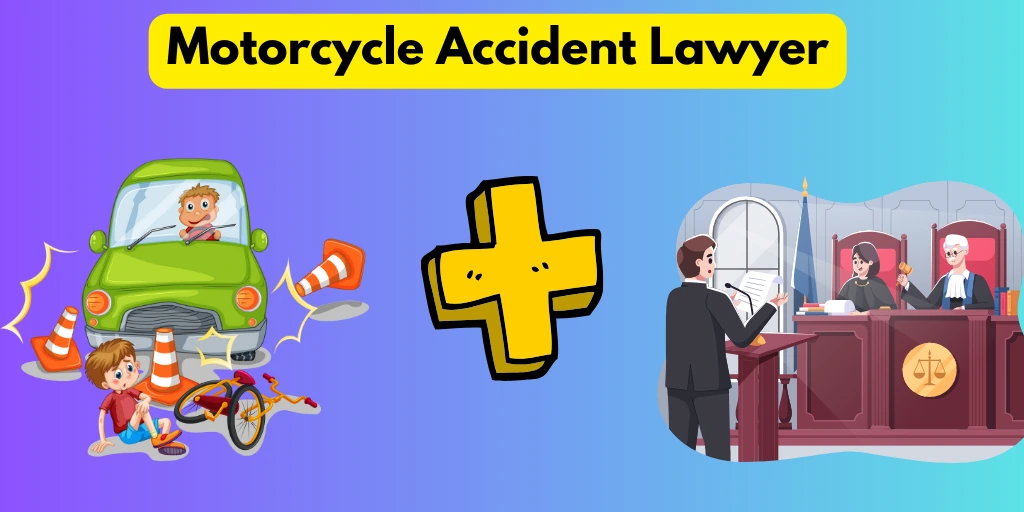Motorcycles are a symbol of freedom and adventure, but they also come with unique risks on the road. Unfortunately, motorcycle accidents can lead to serious injuries, emotional trauma, and significant financial losses. If you or someone you know has been involved in a motorcycle accident, a motorcycle accident lawyer can play a critical role in securing justice and fair compensation.
Who is a Motorcycle Accident Lawyer?
A motorcycle accident lawyer is a legal professional who specializes in handling cases related to motorcycle accidents. These lawyers have in-depth knowledge of traffic laws, personal injury claims, insurance processes, and the unique challenges faced by motorcyclists. Their primary goal is to protect the rights of accident victims and ensure they receive the compensation they deserve.
The Role of a Motorcycle Accident Lawyer
A motorcycle accident lawyer wears many hats throughout the legal process. From investigating the accident to negotiating with insurance companies, their work involves a wide range of responsibilities aimed at helping their clients recover physically, emotionally, and financially.
1. Case Evaluation
The first step a motorcycle accident lawyer takes is evaluating your case. This involves:
- Listening to Your Story: Understanding the details of the accident, injuries sustained, and the impact on your life.
- Assessing Liability: Determining who was at fault for the accident.
- Estimating Damages: Calculating the potential compensation you may be entitled to, including medical expenses, lost wages, property damage, and emotional distress.
2. Gathering Evidence
To build a strong case, your lawyer will gather crucial evidence. This may include:
See Result 2081
- Police Reports: Reviewing the official accident report for details about the incident.
- Witness Statements: Interviewing witnesses who saw the accident.
- Photographic and Video Evidence: Analyzing images or videos of the accident scene, damaged vehicles, and injuries.
- Medical Records: Collecting documentation of your injuries and treatment.
- Accident Reconstruction: Collaborating with experts to recreate the accident and establish fault.
3. Communicating with Insurance Companies
Dealing with insurance companies can be challenging, especially when they aim to minimize payouts. A motorcycle accident lawyer acts as your advocate by:
- Filing Claims: Ensuring that all necessary claims are submitted on time.
- Negotiating Settlements: Engaging in discussions with insurance adjusters to secure a fair settlement.
- Handling Denials: Challenging denied claims and providing evidence to support your case.
4. Calculating Damages
A significant part of a lawyer’s job is determining the full extent of your losses. These damages can include:
- Economic Damages: Medical bills, rehabilitation costs, lost income, and property damage.
- Non-Economic Damages: Pain and suffering, emotional distress, and loss of enjoyment of life.
- Punitive Damages: In cases of gross negligence, punitive damages may be pursued to penalize the responsible party.
5. Representing You in Court
If negotiations with insurance companies or the at-fault party fail, your lawyer will take the case to court. This involves:
- Filing a Lawsuit: Preparing legal documents to initiate a lawsuit.
- Building a Case: Presenting evidence, witness testimonies, and expert opinions in court.
- Arguing Your Case: Advocating on your behalf before a judge and jury to secure a favorable verdict.
Why You Need a Motorcycle Accident Lawyer
Motorcycle accidents often result in severe injuries, such as fractures, spinal cord injuries, or traumatic brain injuries. Navigating the legal and insurance systems while recovering can be overwhelming. Here’s why hiring a motorcycle accident lawyer is crucial:
1. Knowledge of Motorcycle Laws
Motorcyclists face unique legal challenges due to biases and misconceptions. A specialized lawyer understands the laws that protect riders and can counter any prejudice against you.
2. Experience with Insurance Tactics
Insurance companies often use strategies to undervalue claims or deny them outright. A lawyer knows these tactics and can effectively counter them to ensure you receive a fair settlement.
3. Maximizing Compensation
Without legal expertise, you might miss out on compensation for non-economic damages like pain and suffering. A lawyer ensures that all aspects of your losses are considered.
4. Reducing Stress
Dealing with legal complexities while recovering from injuries can be stressful. A lawyer handles all legal and administrative tasks, allowing you to focus on healing.
Common Challenges in Motorcycle Accident Cases
1. Establishing Fault
Proving who was at fault in a motorcycle accident can be tricky, especially if there are conflicting accounts of the incident. A lawyer uses evidence, expert testimony, and legal knowledge to establish liability.
2. Dealing with Bias
Motorcyclists often face bias from law enforcement, insurance companies, and even juries. A skilled lawyer knows how to overcome these prejudices and present a compelling case.
3. Understanding Complex Laws
Motorcycle accident cases involve a mix of traffic laws, personal injury laws, and insurance regulations. An experienced lawyer can navigate these complexities to your advantage.
When Should You Contact a Motorcycle Accident Lawyer?
Timing is critical when dealing with a motorcycle accident. Here are some scenarios where you should contact a lawyer immediately:
- Severe Injuries: If the accident caused serious injuries requiring extensive medical treatment.
- Disputed Liability: If there’s a disagreement about who caused the accident.
- Insurance Denials: If your claim has been denied or undervalued by the insurance company.
- Complex Cases: If the accident involved multiple parties or hit-and-run scenarios.
How to Choose the Right Motorcycle Accident Lawyer
Selecting the right lawyer can make all the difference in your case. Here are some tips:
1. Look for Experience
Choose a lawyer who specializes in motorcycle accident cases and has a proven track record of success.
2. Check Reviews and Testimonials
Client reviews and testimonials can provide insight into the lawyer’s expertise, professionalism, and dedication.
3. Ask About Fees
Most motorcycle accident lawyers work on a contingency fee basis, meaning they only get paid if you win your case. Confirm this arrangement upfront.
4. Schedule a Consultation
A consultation allows you to discuss your case, evaluate the lawyer’s approach, and determine if they’re the right fit for you.
Frequently Asked Questions (FAQs)
1. How much does a motorcycle accident lawyer charge?
Most motorcycle accident lawyers work on a contingency fee basis, typically taking 25-40% of the settlement or award.
2. Can I handle my case without a lawyer?
While it’s possible to represent yourself, hiring a lawyer significantly increases your chances of securing fair compensation, especially in complex cases.
3. How long does it take to resolve a motorcycle accident case?
The timeline varies based on the case’s complexity, the extent of injuries, and whether the case goes to court. Some cases settle in weeks, while others take months or years.
4. What if I was partially at fault?
In many states, you can still recover damages even if you were partially at fault, though your compensation may be reduced.
Conclusion
A motorcycle accident can be a life-altering event, but you don’t have to navigate the aftermath alone. A motorcycle accident lawyer serves as your advocate, ensuring that your rights are protected and that you receive the compensation you deserve. From investigating the accident to representing you in court, their expertise can make a significant difference in your recovery process. SEE RESULT 2081









